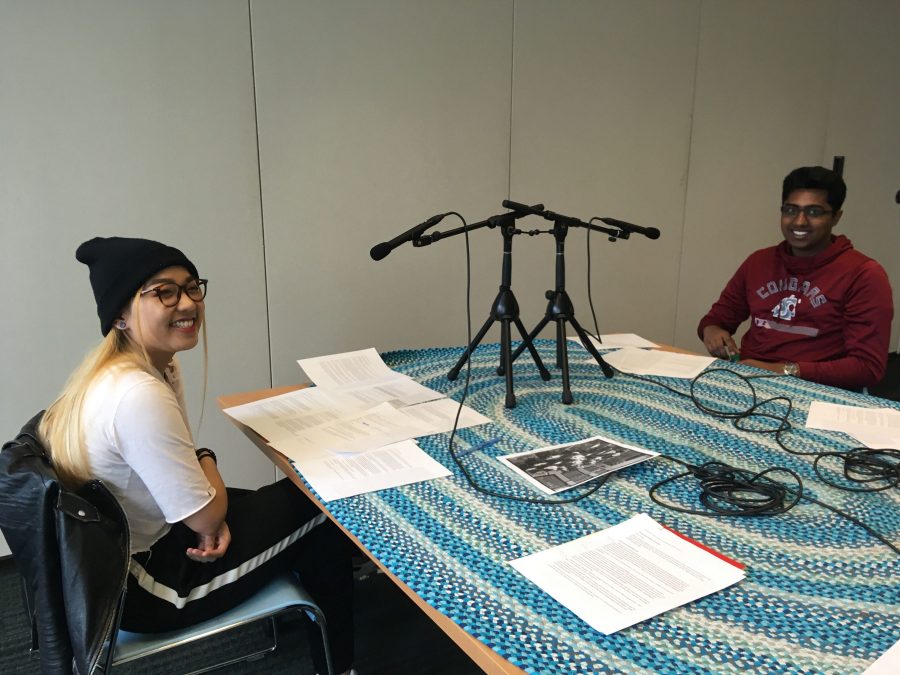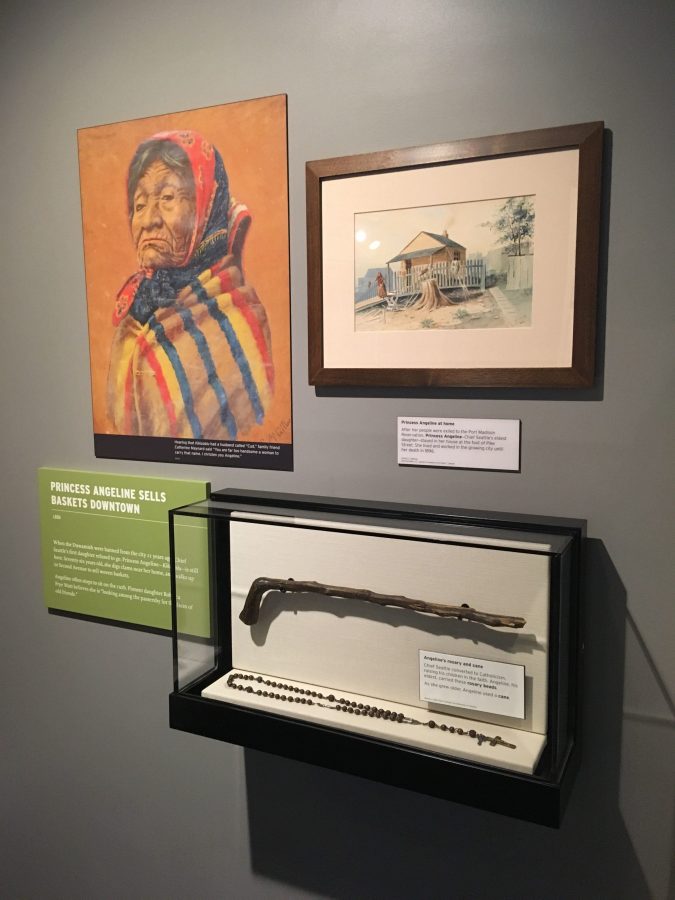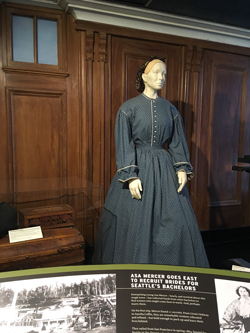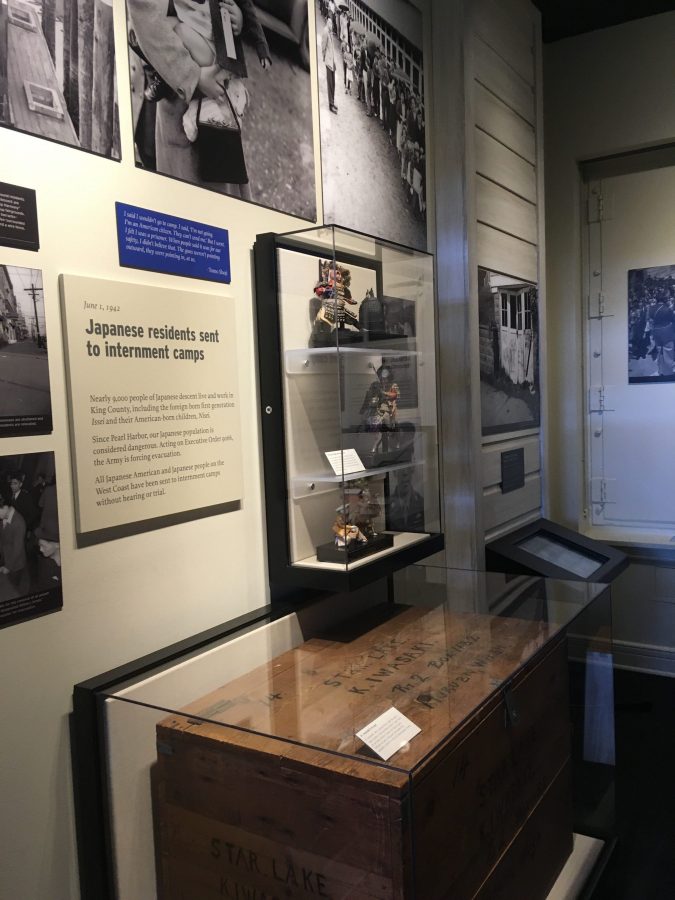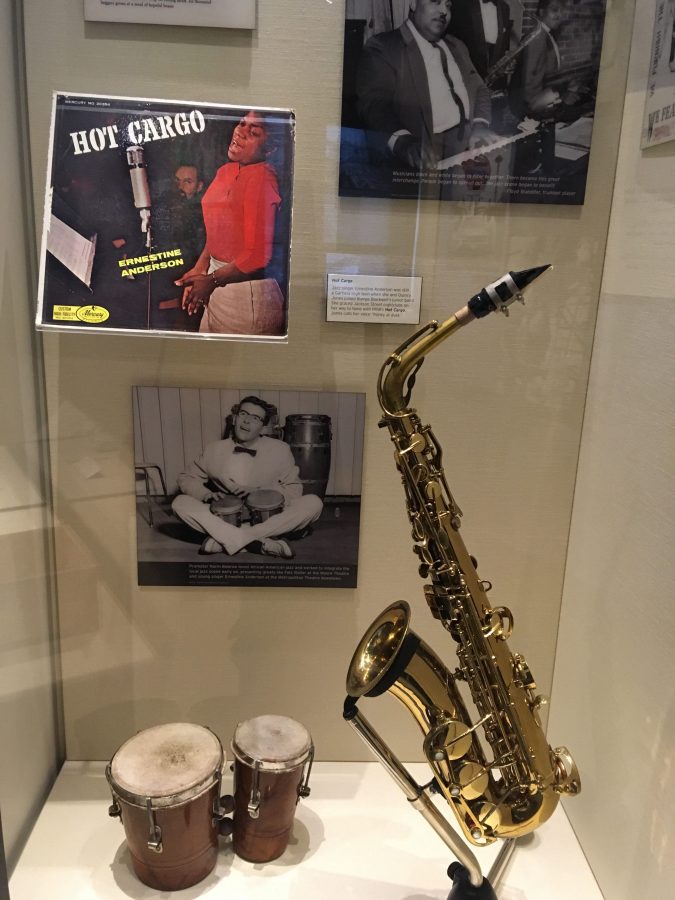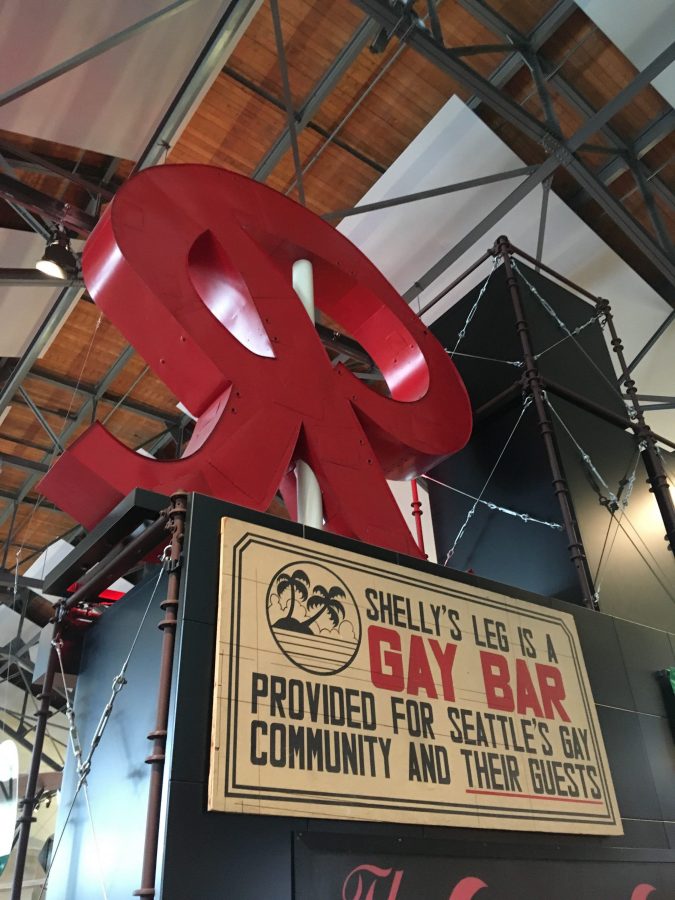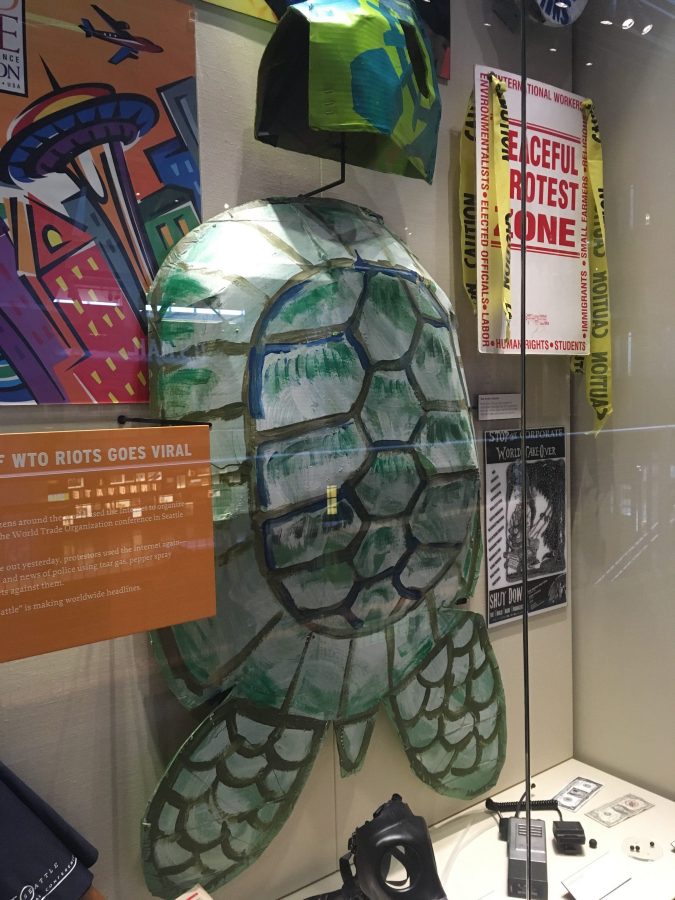-
Rainy Day History Season Two
Season two is all about “growth” – tackling inclusion and exclusion through projects, people, and events that helped expand Seattle and put it on the map!
Learn about marvelous buildings, transit plans that went nowhere, and cultural movements that drew people to the city. We’ll also be exploring how growth for some often comes at the expense of others. There are several new voices this season – not only is there a new MYA team but each episode features a special guest interview.
Launching summer 2020!
-
-
Season Two Trailer
Rainy Day History is back for another season! The 2020 MYA team has been hard at work putting together brand new episodes for you to enjoy this summer.
-
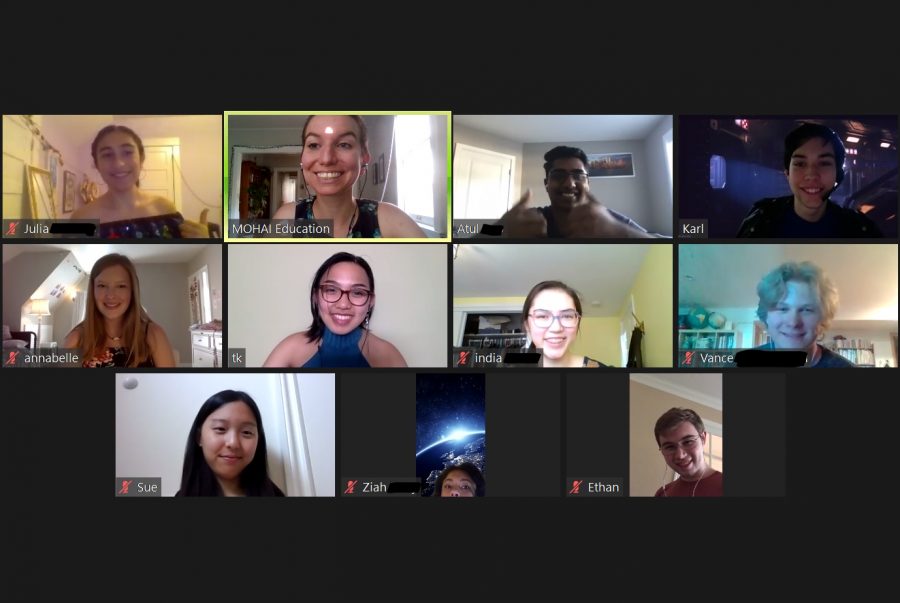
Episode date: July 9, 2020
Length: 4:33
Exploring the theme of “growth”, these eight episodes will be tackling inclusion and exclusion through projects, people, and events that helped expand Seattle and put it on the map. Featuring new voices, new segments, and special guests! In this trailer, hear from host TK about what to expect in season two, interview clips from our first three episodes, and a get a sneak peek at the first episode with a trivia question from India! New episodes to be released every Thursday beginning July 23.
Special Guest Voices (in order of appearance)
Episode Credits
- This trailer was written and performed by TK and India, and produced by Ziah.
- This season was imagined by the 2020 MOHAI Youth Advisors. The podcast was developed by the 2019 MYA.
- Grace designed the logo, and Finch wrote the theme music and performed it along with Tyler and friend of the pod Sylvie Wang.
- Trivia music is “Sounds like Jobim on a Mario in an Elevator” by μB on Free Music Archive.
Stream Rainy Day History Season Two Trailer on SoundCloud
Download a Rainy Day History Season Two Trailer transcript (PDF)
Subscribe and listen on Apple Podcasts, Spotify, and Stitcher
-
Episode 7–Seattle’s Resilient Chinese Pioneers
-
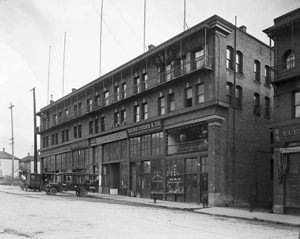
Episode date: July 23, 2020
Length: 34:49
Seattle’s Chinatown/International District has been through a lot over the decades. Learn how Seattle’s earliest Chinese American pioneers built and maintained community in the face of racism, riots, and constant change. In this episode, we explore the resiliency of this neighborhood during its original settlement, re-settlement, and growth in the mid-late 1800s.
Our special guest is Doan Nguyen, Senior Tour Manager at the Wing Luke Museum, who shares about the history of the museum’s building and the stories it has to tell about life in the CID during the era of the Chinese Exclusion Act.
Related MOHAI Content
- View items in the MOHAI online collection related to the Chinese Exclusion Act and the Wa Chong Co.
- Listen to past History Café recordings on SoundCloud related to the Chinese Exclusion Act
- Building Tradition: Pan-Asian Seattle and the Residential Hotels
- Seattle 1860-1910 Through the Eyes of its First Chinese Resident
- Untold Stories from the Chinese Exclusion Act Files
- Resilience Past and Present in the Chinatown International District
- Most relevant gallery in True Northwest: The Seattle Journey – High Hopes
Episode Sources
We relied heavily on the following sources to build our narrative:
Additional sources include:
- Beekman, Daniel “We’ve Got To Learn From That Seattle Volunteers Shed New Light On Dark History of Chinese Exclusion“ Seattle Times, 15 December 2018
- History Link (entries 1057 and 8993)
- NY Historical Society “Chinese American: Exclusion/Inclusion” exhibit classroom materials
- Pacific Coast Architecture Database (PCAD) entry for the East Kong Yick Building
- Van Huygen, Meg “The Grim History of INS Building“, Curbed Seattle, 31 October 2017
- Williams, David B. “Author seeks descendants of Ship Canal workers from 1800s” Northwest Asian Weekly, 19 August 2016.
- The Angel Island Detention Center poem we read can be found in Him Mark Lai, Genny Lim, and Judy Yung, Island: Poetry and History of Chinese Immigrants on Angel Island, 1910-1940. University of Washington Press, 1 May 1991.
Episode Credits
- Special thanks to our interview guest, Doan Nguyen!
- The script was researched by India and Jason, written by Jason, and edited by TK & India.
- This episode was produced by Annabelle & Julia and edited by Sue and Vance.
- Show notes and transcripts were built by Julia, Ziah, India, & Ethan. Marketing help came from TK.
- This season was imagined by the 2020 MOHAI Youth Advisors. The podcast was developed by the 2019 MYA.
- Grace designed the logo, and Finch wrote the theme music and performed it along with Tyler and friend of the pod Sylvie Wang.
- Thank you to all of our MOHAI staff cheerleaders, and special thanks for this season goes to Chris, Leonard, Sondra, Tori, and Emily T.
- Rain sound effects came from https://freesound.org/people/barkenov/sounds/255900/
- Trivia music is “Sounds like Jobim on a Mario in an Elevator” by μB on Free Music Archive
Resources for Further Exploration
Stream Episode 7-Seattle’s Resilient Chinese Pioneers on SoundCloud
Download a transcript of Episode 7-Seattle’s Resilient Chinese Pioneers (PDF)
Subscribe and listen on Apple Podcasts, Spotify, and Stitcher
-
Episode 8–The Forgotten World’s Fair
-
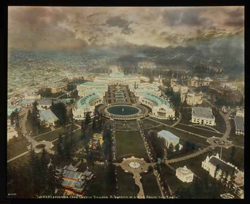
Episode date: July 30, 2020
Length: 32:41
Besides the famous Century 21 World’s Fair that gave Seattle the Space Needle and many of the buildings at Seattle Center, Seattle played host to another World’s Fair, the 1909 Alaska Yukon Pacific Exposition! The AYPE put Seattle on the map by marketing it as a resource-rich global city, showcased the latest technology, and laid the groundwork for the University of Washington’s beautiful Seattle campus.
Hear from special guest Anne Jenner, Pacific Northwest Curator at the UW Libraries Special Collections Division about some of the amazing historic items from the AYPE in their collection and some of the more unbelievable aspects of the fair.
Related MOHAI Content
Episode Sources
We relied heavily on the following sources to build our narrative:
Additional sources include:
- History Link entry 7082
- Beger, Knute. “The birth of modern Seattle” Crosscut, 26 November 2009.
- Klingle, Matthew. Emerald City: an environmental history of Seattle, Yale University Press, 2009.
- The quote about the treatment of Filipinos at the AYP is from a press release from the Pacific Northwest Chapter of BAYAN in 2009
- The quote from Dr. Coll Thrush came from his book Native Seattle, p119. University of Washington Press, 2009.
Episode Credits
- Special thanks to our interview guest, Anne Jenner!
- The script was researched by India & Annabelle, written by Annabelle & Atul, and edited by India & Annabelle.
- This episode was produced by Annabelle & Vance and edited by Karl & Vance.
- Show notes and transcripts were built by Julia, Ziah, India, & Ethan. Marketing help came from Ziah.
- This season was imagined by the 2020 MOHAI Youth Advisors. The podcast was developed by the 2019 MYA.
- Grace designed the logo, and Finch wrote the theme music and performed it along with Tyler and friend of the pod Sylvie Wang.
- Thank you to all of our MOHAI staff cheerleaders, and special thanks for this season goes to Chris, Leonard, Sondra, Tori, and Emily T.
- Rain sound effects came from https://freesound.org/people/barkenov/sounds/255900/
- Trivia music is “Sounds like Jobim on a Mario in an Elevator” by μB on Free Music Archive
Resources for Further Exploration
Stream Episode 8-The Forgotten World’s Fair on SoundCloud
Download a transcript of Episode 8-The Forgotten World’s Fair (PDF)
Subscribe and listen on Apple Podcasts, Spotify, and Stitcher
-
Episode 9–A Lamentable Spectacle
-
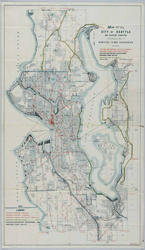
Episode date: August 6, 2020
Length: 31:04
Seattle transit plans have always had a hard time at the polls, going all the way back to 1911, when voters overwhelmingly rejected Virgil Bogue’s vision for a Seattle with public transit at its core. The Bogue Plan was the city’s first comprehensive plan and included big and bold ideas: 90 miles of rail transit, a brand-new civic center and grand central station, converting all of Mercer Island into a public park, and more! How did the plan’s spectacular failure at the polls shape the way we navigate and inhabit our city today?
Hear from special guest Eric Scigliano, writer and journalist, about what he’s learned from researching the Bogue Plan and other “Seattles that might have been”.
Related MOHAI Content
Episode Sources
We relied heavily on the following sources to build our narrative:
Additional sources include:
The quote from the Daily Mail was found in Sarah Anne Lloyd’s article “Seattle’s Long History of Transit Funding” on Curbed Seattle, 29 October 2019.
Additional quotes and population statistics were found in Ross Anderson’s article listed above.
Episode Credits
- Special thanks to our interview guest, Eric Scigliano!
- The script was researched by India & Ethan, written by Atul & Jason, edited by India, Karl, and Ethan.
- This episode was produced by Sue & Julia and edited by Karl, Sue, & Vance.
- Show notes and transcripts were built by Julia, Ziah, India, & Ethan. Marketing help came from Ziah & Ethan
- This season was imagined by the 2020 MOHAI Youth Advisors. The podcast was developed by the 2019 MYA.
- Grace designed the logo, and Finch wrote the theme music and performed it along with Tyler and friend of the pod Sylvie Wang.
- Thank you to all of our MOHAI staff cheerleaders, and special thanks for this season goes to Chris, Leonard, Sondra, Tori, and Emily T.
- Rain sound effects came from https://freesound.org/people/barkenov/sounds/255900/
- Trivia music is “Sounds like Jobim on a Mario in an Elevator” by μB on Free Music Archive
Resources for Further Exploration
Stream Episode 9-A Lamentable Spectacle on SoundCloud
Download a transcript of Episode 9-A Lamentable Spectacle (PDF)
Subscribe and listen on Apple Podcasts, Spotify, and Stitcher
-
Episode 10–Serenity, Surprise, and Delight
-
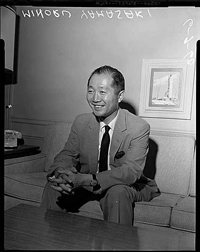
Episode date: August 13, 2020
Length: 35:49
Explore the life, times, and creations of architect Minoru Yamasaki, designer of many iconic buildings including the Pacific Science Center arches, downtown Seattle’s Rainier Tower, and the original World Trade Center. Although Yamasaki’s buildings are spread across the globe, his life and career are deeply connected to Seattle’s history.
Hear from special guest Dr. Paul Kidder, professor of philosophy at Seattle University who is currently writing a book about Yamasaki, about what he finds fascinating about Yamasaki’s designs.
Related MOHAI Content
- View items in MOHAI’s online collection about Minoru Yamasaki
- Most relevant gallery in True Northwest: the Seattle Journey – Changes
Episode Sources
We relied heavily on the following sources to build our narrative:
Additional research came from:
Quotes about Yamasaki’s artistic philosophy and Yamasaki’s translated term, from a Time Magazine interview, were found in Dale Allen Gyure’s article in the Architectural Review listed above.
Quotes written by Minoru Yamasaki himself came from his autobiography, A Life in Architecture. Weatherhill, 1 September 1979.
Episode Credits
- Special thanks to our interview guest, Dr. Paul Kidder!
- The script was researched by Karl & Atul, written by Karl, and edited by TK & Vance.
- This episode was produced by Vance & Karl and edited by Karl & Vance.
- Show notes and transcripts were built by Julia, Ziah, India, & Ethan. Marketing help came from TK.
- This season was imagined by the 2020 MOHAI Youth Advisors. The podcast was developed by the 2019 MYA.
- Grace designed the logo, and Finch wrote the theme music and performed it along with Tyler and friend of the pod Sylvie Wang.
- Thank you to all of our MOHAI staff cheerleaders, and special thanks for this season goes to Chris, Leonard, Sondra, Tori, and Emily T.
- Rain sound effects came from https://freesound.org/people/barkenov/sounds/255900/
- Trivia music is “Sounds like Jobim on a Mario in an Elevator” by μB on Free Music Archive
Resources for Further Exploration
- Photos of buildings designed by Yamasaki mentioned in this episode:
- Pruitt-Igoe housing, St Louis, 1954 https://www.archdaily.com/870685/ad-classics-pruitt-igoe-housing-project-minoru-yamasaki-st-louis-usa-modernism
- McGregor Memorial Conference Center, Detroit, 1958 and several other buildings at Wayne State University https://www.trystcraft.com/single-post/2018/03/23/The-Architecture-of-Minoru-Yamasaki-at-Wayne-State-University
- Daharan Airport, Saudi Arabia, 1961 https://www.tam.usace.army.mil/Media/News-Stories/Article/485031/a-lasting-legacy-the-dhahran-airfield-and-civil-air-terminal/
- US Science Pavilion, Seattle World’s Fair, 1962 https://www.pacificsciencecenter.org/pacsci-stories/blast-past-fascinating-history-pacific-science-centers-architecture/
- IBM Building, Seattle, 1963 http://www.skyscrapercenter.com/building/ibm-building/19708
- North Shore Congregation Synagogue, Illiniois, 1964 https://synagogues360.bh.org.il/gallery/north-shore-congregation-israel/
- World Trade Center, New York, 1971 https://www.archdaily.com/504682/ad-classics-world-trade-center-minoru-yamasaki-associates-emery-roth-and-sons
- Rainier Bank Tower, Seattle, 1977 https://www.amusingplanet.com/2016/01/rainier-tower-or-beaver-building.html
- Seattle Architecture Foundation
- Pacific Coast Architecture Database
- “The Lasting Impact of Seattle’s World’s Fair Architects” by Joe Fallensbee in Seattle Magazine, April 2012.
- UW Special Collections “Shaping Seattle architecture: a historical guide to the architects” essay and link to their architectural drawings database
- National Trust for Historic Preservation’s overview of Modern Architecture
- “12 Important Modernist Styles Explained” by Niall Patrick Walsh in ArchDaily, March 2020
Stream Episode 10-Serenity, Surprise, and Delight on SoundCloud
Download a transcript of Episode 10-Serenity, Surprise, and Delight (PDF)
Subscribe and listen on Apple Podcasts, Spotify, and Stitcher
-
Episode 11–Location, Location, Location
-
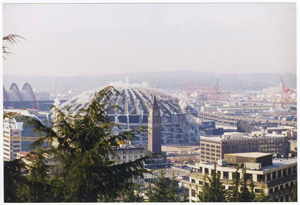
Episode date: August 20, 2020
Length: 32:57
The now gone but fondly remembered Kingdome stadium came into being in the 1970s as a result of a package of ballot initiatives called Forward Thrust. Although the proposal to build a new stadium did well at the polls, finding a place to put it proved more than difficult. When its location near King Street was decided, community activists in the Chinatown International District pushed back, sparking a larger neighborhood preservation movement whose work and legacy still continues today.
Hear from special guest Gary Iwamoto about this era of activism and the founding of InterIm CDA, an affordable housing and community development organization.
Related MOHAI Content
Episode Sources
We relied heavily on the following sources to build our narrative:
Additional research came from:
The quote from Jim Ellis was found in Shaun Scott’s Part 2 essay linked above, and is from a November 1965 speech where he commenced the Forward Thrust effort.
Episode Credits
- Special thanks to our interview guest, Gary Iwamoto, and the staff & volunteers at InterIm CDA!
- This season was imagined by the 2020 MOHAI Youth Advisors. The podcast was developed by the 2019 MYA.
- Grace designed the logo, and Finch wrote the theme music and performed it along with Tyler and friend of the pod Sylvie Wang.
- Thank you to all of our MOHAI staff cheerleaders, and special thanks for this season goes to Chris, Leonard, Sondra, Tori, and Emily T.
- Rain sound effects came from https://freesound.org/people/barkenov/sounds/255900/
- Trivia music is “Sounds like Jobim on a Mario in an Elevator” by μB on Free Music Archive
Resources for Further Exploration
Stream Episode 11-Location, Location, Location on SoundCloud
Download a transcript of Episode 11-Location, Location, Location (PDF)
Subscribe and listen on Apple Podcasts, Spotify, and Stitcher
-
Episode 12–I Need the Volume Higher
-
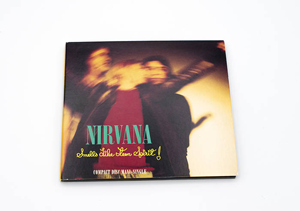
Episode date: August 27, 2020
Length: 34:41
We hope you’re ready to rock, because this episode we’re diving headfirst into the 1990s Seattle music scene. From grunge, to riot grrrl, to hip hop, learn about how these young artists put Seattle music (and its style) on the map at the same time the Teen Dance Ordinance made all-ages shows nearly impossible to produce.
Our special guest this episode is Tova Gaster, director of outreach for the TeenTix New Guard, Teen Editor with the TeenTix Press Corps, and avid all ages show-goer.
Related MOHAI Content
Episode Sources
We relied heavily on the following sources to build our narrative:
Additional research came from:
The quote from Kio Novina came from Jennifer Vogel’s Mother Jones article listed above.
This episode’s title comes from “Posse on Broadway” by Sir Mix-a-Lot.
Episode Credits
- Special thanks to our interview guest, Tova Gaster, and the TeenTix New Guard!
- The script was researched by Jason, written by Jason, and edited by TK & Vance. This episode was produced by Vance and edited by Karl & Vance.
- Show notes and transcripts were built by Julia, Ziah, India, & Ethan. Marketing help came from Ziah.
- This season was imagined by the 2020 MOHAI Youth Advisors. The podcast was developed by the 2019 MYA. Grace designed the logo, and Finch wrote the theme music and performed it along with Tyler and friend of the pod Sylvie Wang.
- Thank you to all of our MOHAI staff cheerleaders, and special thanks for this season goes to Chris, Leonard, Sondra, Tori, and Emily T.
- Rain sound effects came from https://freesound.org/people/barkenov/sounds/255900/
- Trivia music is “Sounds like Jobim on a Mario in an Elevator” by μB on Free Music Archive
Resources for Further Exploration
Stream Episode 12-I Need the Volume Higher on SoundCloud
Download a transcript of Episode 12-I Need the Volume Higher (PDF)
Subscribe and listen on Apple Podcasts, Spotify, and Stitcher
-
Episode 13–A Place of Escape
-
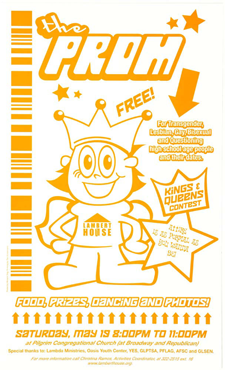
Episode date: September 3, 2020
Length: 36:51
Since the 1970s, Capitol Hill has been a home for the LGBTQ+ community in Seattle. Over the decades, LGBTQ+ businesses and services have both contributed to gentrification and been at risk from it. Learn about what it took to grow and build a supportive district for Seattle’s LGBTQ+ residents, as we explore the relationship between place and community.
Hear from special guest Ken Shulman, Executive Director of Lambert House, about where queer youth fit into this history and the importance of the neighborhood to the organization.
Related MOHAI Content
Episode Sources
We relied heavily on the following sources to build our narrative:
Additional research came from:
- Albright, David “There Goes the Gayborhood” KCTS9, 8 March 2018
- Balk, Gene. “The decade in demographics: top 5 changes in the Seattle area” Seattle Times. 30 December 2019.
- Connelly, Joel and Grant Hindsley, “Seattle in the 1970s: From big city to bit-time metropolis” Seattle PI, 6 February 2018
- Puget Sound Business Journal “Seattle among US metros that saw largest increases in past decade” (17 December 2019)
- Pulkkinen, Levi “How did Capitol Hill become Seattle’s gay neighborhood?” Seattle PI, 15 September 2016
- Radke, Bill and Matt Martin. “Lambert House could be pushed off Capitol Hill” KUOW. 28 April, 2016.
The quote from Randy Henson that gave us our episode title came from a piece he wrote for the Seattle Eagle, “Randy Henson’s brief history of the Seattle Eagle: Daring to be different for 35 years“, 27 June 2015.
The quote about the Dorian Society came from History Link.
The quote from Kevin McKenna and Michael Aguirre came from their essay for the UW Civil Rights & Labor History Project “A brief history of LGBTQ Activism in Seattle.”
Episode Credits
- Special thanks to our interview guest, Ken Schulman, and the staff & volunteers at Lambert House!
- The script was researched by TK & Ethan, written by TK & Ethan, edited by TK & Karl. This episode was produced by Julia and edited by Sue & Vance.
- Show notes and transcripts were built by Julia, Ziah, India, & Ethan. Marketing help came from TK & Ziah.
- This season was imagined by the 2020 MOHAI Youth Advisors. The podcast was developed by the 2019 MYA. Grace designed the logo, and Finch wrote the theme music and performed it along with Tyler and friend of the pod Sylvie Wang.
- Thank you to all of our MOHAI staff cheerleaders, and special thanks for this season goes to Chris, Leonard, Sondra, Tori, and Emily T.
- Rain sound effects came from https://freesound.org/people/barkenov/sounds/255900/
- Trivia music is “Sounds like Jobim on a Mario in an Elevator” by μB on Free Music Archive
Resources for Further Exploration
Stream Episode 13-A Place of Escape on SoundCloud
Download a transcript of Episode 13-A Place of Escape (PDF)
Subscribe and listen on Apple Podcasts, Spotify, and Stitcher
-
Episode 14–Booms, Busts, and Billionaires
-
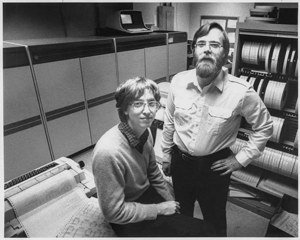
Episode date: September 9, 2020
Length: 35:38
It’s the final episode of the season! There’s no denying it: Seattle is a tech city. After Microsoft moved to the Pacific Northwest, the Seattle area became a hub for computer and internet tech start-ups in the 1990s. Some saw incredible success, while others just weren’t able to survive. We’ll be looking at the 90s-era and contemporary tech booms, and the effects that large companies like Amazon and Microsoft have had on Seattle.
Plus, hear from special guest Naud Frijlink, Principal Design Manager at Microsoft, about what it’s been like working in the sector across multiple decades and cities.
Related MOHAI Content
Episode Sources
We relied heavily on the following sources to build our narrative:
- MOHAI exhibit labels and research from Beyond Bollywood and True Northwest.
- Balk, Gene. “Seattle hits record high for income inequality, now rivals San Francisco” Seattle Times. 17 November, 2017.
- Bellis, Mary. “A short history of Microsoft” Thought Co. 10 January 2020.
- Cook, John. “Meet Amazon.com’s first employee: Shel Kaphan” GeekWire. 14 June 2011. Four part interview.
- Hall, Mark. “Amazon.com” Britannica Online.
- Hayes, Adam. “Dotcom Bubble” Investopedia. 25 Jun 2019.
- Hansen, Lily. “To No One’s Surprise, Seattle Is a Rich Tech Startup City” Seattle Met. 25 June 2019.
- History.com editors, “This Day In History: Microsoft Founded” History.
- Johnson, Kirk. “Lured by Seattle’s tech boom, but being left behind” New York Times. 3 May 2016.
- Martinez, Amy and Kristi Heinz. “Amazon a virtual no-show in hometown philanthropy” Seattle Times. 31 March 2012.
- McGee, Henry. “Gentrification, integration, or displacement?: the Seattle story” BlackPast. 18 August 2007.
- Weinberger, Matt. “21 photos of Microsoft’s historic rise to rule the PC world” Business Insider. 18 July 2015.
Additional research came from:
- “Amazon, B&N settle lawsuit” CNet. 21 October 1997.
- Balk, Gene. “Think Seattle’s rich? This Eastside city tops census list of richest U.S. cities” Seattle Times. 7 October 2019.
- Levy, Nat. “Look out, Bay Area: Seattle rises to 2nd best tech city in the U.S., passing Washington D.C.” Geek Wire. 18 July 2017.
- Martin, Emmie. “If you had invested $1,000 in Microsoft at its IPO, here’s how much money you’d have now” CNBC. 19 November 2018.
- McCann, Nick. “Washington Appeals Court Finds Seattle Income Tax Unconstitutional” Courthouse News Service. 15 July 2019.
- Neighborhood Scout’s Sammamish trends and housing market data
- Ovide, Shira. “Amazon Captures 5 Percent of American Retail Spending. Is That a Lot?” Bloomberg Businessweek. 8 August 2018.
- Read, Richard. “Seattle takes a small step against gentrification” Los Angeles Times. 16 April 2019.
- Redfin’s Central District Housing Market Insights
- Strumpf, Dan. “Nasdaq Composite Ends Above 5000 for First Time Since Dot-Com Era” Wall Street Journal. 2 March 2015.
- “Wal-Mart sues Amazon.com” CBS News. 16 October 1998.
- Warren, Tom. “Microsoft is now a $1 trillion dollar company” The Verge. 25 April 2019.
Episode Credits
- Special thanks to our interview guest, Naud Frijlink!
- The script was researched by India, Karl, & Atul, written by Karl, Atul, Ethan, & Jason, and edited by Annabelle. This episode was produced by Julia and edited by Sue & Karl.
- Show notes and transcripts were built by Julia, Ziah, India, & Ethan. Marketing help came from Ziah.
- This season was imagined by the 2020 MOHAI Youth Advisors. The podcast was developed by the 2019 MYA. Grace designed the logo, and Finch wrote the theme music and performed it along with Tyler and friend of the pod Sylvie Wang.
- Thank you to all of our MOHAI staff cheerleaders, and special thanks for this season goes to Chris, Leonard, Sondra, Tori, and Emily T.
- Rain sound effects came from https://freesound.org/people/barkenov/sounds/255900/
- Trivia music is “Sounds like Jobim on a Mario in an Elevator” by μB on Free Music Archive
Resources for Further Exploration
Stream Episode 14-Booms, Busts, and Billionaires on SoundCloud
Download a transcript of Episode 14-Booms, Busts, and Billionaires (PDF)
Subscribe and listen on Apple Podcasts, Spotify, and Stitcher
-
Bonus Episode–Extended Interview With Anne Jenner
-
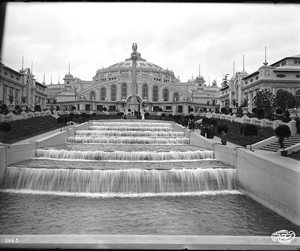
Episode date: January 15, 2021
Length: 34:48
In this bonus episode we have an extended interview from Episode 8-The Forgotten World’s Fair. Special guest Anne Jenner, Pacific Northwest Curator at the UW Libraries Special Collections Division, discusses with our very own Annabelle some of her favorite pieces in the collection from the 1909 Alaska Yukon Pacific Exposition, some of its more peculiar exhibits, and what it was like for people going to the fair.
Episode Credits
- Special thanks to our interview guest, Anne Jenner!
- Audio editing was done by Vance and the transcript was made by Julia. Annabelle produced the interview.
- Season 2 was imagined by the 2020 MOHAI Youth Advisors. The podcast was developed by the 2019 MYA. Grace designed the logo, and Finch wrote the theme music and performed it along with Tyler and friend of the pod Sylvie Wang.
- Thank you to all of our MOHAI staff cheerleaders, and special thanks for this season goes to Chris, Leonard, Sondra, Tori, and Emily T.
Download a transcript of Bonus Episode-Extended Interview With Anne Jenner (PDF)
Subscribe and listen on Apple Podcasts, Spotify, and Stitcher
-
Bonus Episode–Extended Interview With Dr. Paul Kidder
-
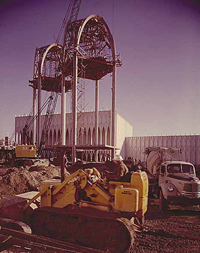
Episode date: January 29, 2021
Length: 52:22
In this bonus episode we have an extended interview from Episode 10-Serenity, Surprise, and Delight. Special guest Dr. Paul Kidder, Professor of Philosophy at Seattle University, discusses with our very own Karl on the life and work of Minoru Yamasaki, in particular his style influences and highlighting specific works by him.
Episode Credits
- Special thanks to our interview guest, Dr. Paul Kidder!
- Audio editing was done by Karl and the transcript was made by Julia. Karl and Vance produced the interview.
- Season 2 was imagined by the 2020 MOHAI Youth Advisors. The podcast was developed by the 2019 MYA. Grace designed the logo, and Finch wrote the theme music and performed it along with Tyler and friend of the pod Sylvie Wang.
- Thank you to all of our MOHAI staff cheerleaders, and special thanks for this season goes to Chris, Leonard, Sondra, Tori, and Emily T.
Stream Bonus Episode-Extended Interview With Dr. Paul Kidder on SoundCloud
Download a transcript of Bonus Episode-Extended Interview With Dr. Paul Kidder (PDF)
Subscribe and listen on Apple Podcasts, Spotify, and Stitcher











